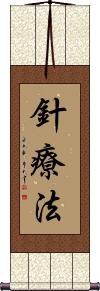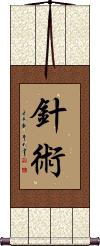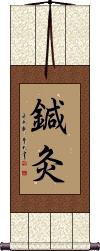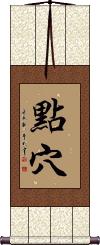Many custom options...
And formats...

Acupuncture in Chinese / Japanese...
Buy an Acupuncture calligraphy wall scroll here!
Personalize your custom “Acupuncture” project by clicking the button next to your favorite “Acupuncture” title below...
Acupuncture
針療法 is one of two ways to write acupuncture in Chinese and Japanese.
The first character means “needle” or “pin.” The second character means “to treat” or “to cure.” The last character means “method” or “way.”
This is the only reasonable selection if your audience is Japanese. This is the formal way to express acupuncture in Chinese, so this version is universal in most of Asia (the best all-around choice in most cases).
Acupuncture
Acupuncture and Moxibustion
鍼灸 is the Chinese, Japanese Kanji, and old Korean Hanja word for acupuncture-moxibustion.
Pressure Points
點穴 means pressure points in Chinese and Japanese.
In martial arts, this term refers to hitting a pressure point or vulnerable body cavity. 點穴 is not the term “dim mak,” but it is often used in place of or with dim mak.
In medical terms, these are just pressure points, which can be places for acupuncture or the application of moxibustion.
See Also: Dim Mak
Not the results for Acupuncture that you were looking for?
Below are some entries from our dictionary that may match your Acupuncture search...
| Characters If shown, 2nd row is Simp. Chinese |
Pronunciation Romanization |
Simple Dictionary Definition |
針術 see styles |
shinjutsu しんじゅつ |
More info & calligraphy: Acupuncture |
壷 see styles |
tsubosaki つぼさき |
(out-dated or obsolete kana usage) (1) jar; pot; vase; (2) dice cup; (3) depression (i.e. the basin of a waterfall); (4) (archaism) target (when aiming an arrow); (5) (kana only) (figurative) bull's-eye; (6) (kana only) key point (of a conversation, etc.); (7) (kana only) acupuncture point; moxibustion point; (8) (kana only) nodes on a fingerboard (of a shamisen, etc.); hu (ancient Chinese vessel shaped like a vase, usually used to store alcohol); (surname) Tsubosaki |
壺 壶 see styles |
hú hu2 hu tsubosaki つぼさき |
pot; classifier for bottled liquid (out-dated or obsolete kana usage) (1) jar; pot; vase; (2) dice cup; (3) depression (i.e. the basin of a waterfall); (4) (archaism) target (when aiming an arrow); (5) (kana only) (figurative) bull's-eye; (6) (kana only) key point (of a conversation, etc.); (7) (kana only) acupuncture point; moxibustion point; (8) (kana only) nodes on a fingerboard (of a shamisen, etc.); hu (ancient Chinese vessel shaped like a vase, usually used to store alcohol); (surname) Tsubosaki |
壼 壸 see styles |
kǔn kun3 k`un kun tsubo つぼ tsuho つほ tsufu つふ |
palace corridor; fig. women's quarters; women (irregular kanji usage) (1) jar; pot; vase; (2) dice cup; (3) depression (i.e. the basin of a waterfall); (4) (archaism) target (when aiming an arrow); (5) (kana only) (figurative) bull's-eye; (6) (kana only) key point (of a conversation, etc.); (7) (kana only) acupuncture point; moxibustion point; (8) (kana only) nodes on a fingerboard (of a shamisen, etc.); (irregular kanji usage) (out-dated or obsolete kana usage) (1) jar; pot; vase; (2) dice cup; (3) depression (i.e. the basin of a waterfall); (4) (archaism) target (when aiming an arrow); (5) (kana only) (figurative) bull's-eye; (6) (kana only) key point (of a conversation, etc.); (7) (kana only) acupuncture point; moxibustion point; (8) (kana only) nodes on a fingerboard (of a shamisen, etc.) |
砭 see styles |
biān bian1 pien |
ancient stone acupuncture needle; to criticize; to pierce |
穴 see styles |
xué xue2 hsüeh ana あな |
cave; cavity; hole; acupuncture point; Taiwan pr. [xue4] (1) (colloquialism) ass; arse; buttocks; (2) (colloquialism) rear; end; (3) acupuncture point; (counter) (4) hole; notch; (n,n-suf) (1) hole; (2) deficit; shortage; missing person (in a team, meeting, etc.); (3) vacancy; opening; (4) flaw; (5) profitable place (or item, etc.) not well known by others; (6) upset victory (with a large payoff); (7) (slang) pit (of a theater); (8) (archaism) hiding place; (9) (archaism) underbelly (of society, etc.); (surname) Ana a hole |
腧 see styles |
shù shu4 shu |
(bound form) acupuncture point |
鍼 针 see styles |
zhēn zhen1 chen hari はり |
variant of 針|针[zhen1], needle (1) (acupuncture) needle; (2) (See 鍼術) acupuncture |
ツボ see styles |
tsubo ツボ |
(1) jar; pot; vase; (2) dice cup; (3) depression (i.e. the basin of a waterfall); (4) (archaism) target (when aiming an arrow); (5) (kana only) (figurative) bull's-eye; (6) (kana only) key point (of a conversation, etc.); (7) (kana only) acupuncture point; moxibustion point; (8) (kana only) nodes on a fingerboard (of a shamisen, etc.) |
人中 see styles |
rén zhōng ren2 zhong1 jen chung hitonaka ひとなか |
philtrum; infranasal depression; the "human center" acupuncture point society; company; the public; the world among human beings |
俞穴 see styles |
shù xué shu4 xue2 shu hsüeh |
acupuncture point |
八沖 八冲 see styles |
bā chōng ba1 chong1 pa ch`ung pa chung |
eight surges (a group of eight acupoints in Chinese acupuncture, namely PC-9, TB-1, HT-9 and LV-3, bilaterally) |
印堂 see styles |
yìn táng yin4 tang2 yin t`ang yin tang indou / indo いんどう |
the part of the forehead between the eyebrows; yintang, acupuncture point at the midpoint between the medial ends of the eyebrows (surname) Indou |
命門 命门 see styles |
mìng mén ming4 men2 ming men |
(TCM) the right kidney; (TCM) acupuncture point GV-4, midway between the kidneys; the region between the kidneys; the eyes; (fortune-telling) the temples; (fig.) most critical or vulnerable point |
四瀆 四渎 see styles |
sì dú si4 du2 ssu tu |
(archaic) the four rivers (Yangtze 長江|长江[Chang2 Jiang1], Yellow 黃河|黄河[Huang2 He2], Huai 淮河[Huai2 He2], Ji 濟水|济水[Ji3 Shui3]); (TCM) acupuncture point SJ-9 |
天井 see styles |
tiān jǐng tian1 jing3 t`ien ching tien ching tenjou / tenjo てんじょう |
courtyard; atrium; opening in a roof; skylight; caisson ceiling; (TCM) acupuncture point TB10 (1) ceiling; (2) ceiling price; (price) ceiling; (surname) Tenjō |
扎針 扎针 see styles |
zhā zhēn zha1 zhen1 cha chen |
to give or have an acupuncture treatment |
指法 see styles |
zhǐ fǎ zhi3 fa3 chih fa |
(music) fingering; (TCM) manipulation of acupuncture needles; (keyboard) typing technique; (dance) hand movements; (painting) finger method |
攻砭 see styles |
gōng biān gong1 bian1 kung pien |
to perform acupuncture |
暈針 晕针 see styles |
yùn zhēn yun4 zhen1 yün chen |
to faint during acupuncture or injection |
死穴 see styles |
sǐ xué si3 xue2 ssu hsüeh |
lethal point (acupuncture); vulnerable spot; Achilles' heel |
毫針 毫针 see styles |
háo zhēn hao2 zhen1 hao chen |
acupuncture needle |
火針 see styles |
hibari ひばり |
heated acupuncture needle; hot acupuncture needle |
火鍼 see styles |
hibari ひばり |
heated acupuncture needle; hot acupuncture needle |
留針 留针 see styles |
liú zhēn liu2 zhen1 liu chen tomebari とめばり |
to leave an inserted needle in place for a period of time (acupuncture) pin |
砭石 see styles |
biān shí bian1 shi2 pien shih |
stone needle used in acupuncture |
穴位 see styles |
xué wèi xue2 wei4 hsüeh wei |
acupuncture point; location of a grave |
穴脈 穴脉 see styles |
xué mài xue2 mai4 hsüeh mai |
node (center of energy); acupuncture point; Chakra |
穴道 see styles |
xué dào xue2 dao4 hsüeh tao |
acupuncture point; acupoint |
経穴 see styles |
keiketsu / keketsu けいけつ |
acupuncture point |
Click here for more Acupuncture results from our dictionary
The following table may be helpful for those studying Chinese or Japanese...
| Title | Characters | Romaji (Romanized Japanese) | Various forms of Romanized Chinese | |
| Acupuncture | 針療法 针疗法 | hari ryou hou hariryouhou hari ryo ho | zhēn liáo fǎ zhen1 liao2 fa3 zhen liao fa zhenliaofa | chen liao fa chenliaofa |
| Acupuncture | 針術 针术 | shinjutsu | zhēn shù / zhen1 shu4 / zhen shu / zhenshu | chen shu / chenshu |
| Acupuncture and Moxibustion | 鍼灸 / 針灸 针灸 | shin kyuu / shinkyuu / shin kyu | zhēn jiǔ / zhen1 jiu3 / zhen jiu / zhenjiu | chen chiu / chenchiu |
| Pressure Points | 點穴 点穴 | tenketsu | diǎn xué / dian3 xue2 / dian xue / dianxue | tien hsüeh / tienhsüeh |
| In some entries above you will see that characters have different versions above and below a line. In these cases, the characters above the line are Traditional Chinese, while the ones below are Simplified Chinese. | ||||
Successful Chinese Character and Japanese Kanji calligraphy searches within the last few hours...







